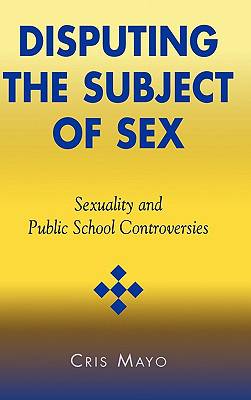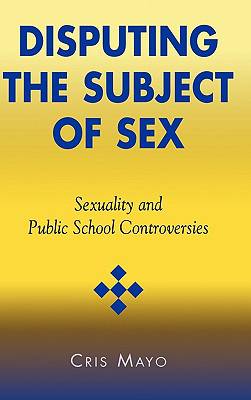
- Afhalen na 1 uur in een winkel met voorraad
- Gratis thuislevering in België vanaf € 30
- Ruim aanbod met 7 miljoen producten
- Afhalen na 1 uur in een winkel met voorraad
- Gratis thuislevering in België vanaf € 30
- Ruim aanbod met 7 miljoen producten
Zoeken
€ 122,95
+ 245 punten
Uitvoering
Omschrijving
Sexuality remains a hotly debated subject, nowhere more so than in education. This perceptive and balanced book shows that discussions of sexuality and schooling can be simultaneously polarizing and democratizing. Disputing the Subject of Sex examines controversies over sex, AIDS, and gay-inclusive multicultural education, which offer especially fruitful opportunities to explore the claims of various identities, the social aims of public schools, and the relation between schools and the publics they serve. These controversies help to show the kind of confused tumble of discourses, seemingly nonsensical policy decisions, and student resistances that are born of arguments over sexuality and community membership. In part, disputes over sexuality are driven by conservative and anti-pluralist agendas that help communities draw strong lines around themselves in an effort to stave off what they perceive as threatening shifts in gender and sexual identity. However, these disputes are also democratizing, allowing a variety of constituents to argue their case in the public sphere. Rather than choosing between one of these two positions, this book uses case studies, interviews with queer youth, and analysis of curricular texts to help readers understand how power dynamics play out in educational controversies and how they can guide us to new ideas about students' abilities to learn and relate ethically to one another about the subject of sex.
Specificaties
Betrokkenen
- Auteur(s):
- Uitgeverij:
Inhoud
- Aantal bladzijden:
- 202
- Taal:
- Engels
- Reeks:
Eigenschappen
- Productcode (EAN):
- 9780742526587
- Verschijningsdatum:
- 3/05/2004
- Uitvoering:
- Hardcover
- Formaat:
- Genaaid
- Afmetingen:
- 165 mm x 229 mm
- Gewicht:
- 421 g

Alleen bij Standaard Boekhandel
+ 245 punten op je klantenkaart van Standaard Boekhandel
Beoordelingen
We publiceren alleen reviews die voldoen aan de voorwaarden voor reviews. Bekijk onze voorwaarden voor reviews.











